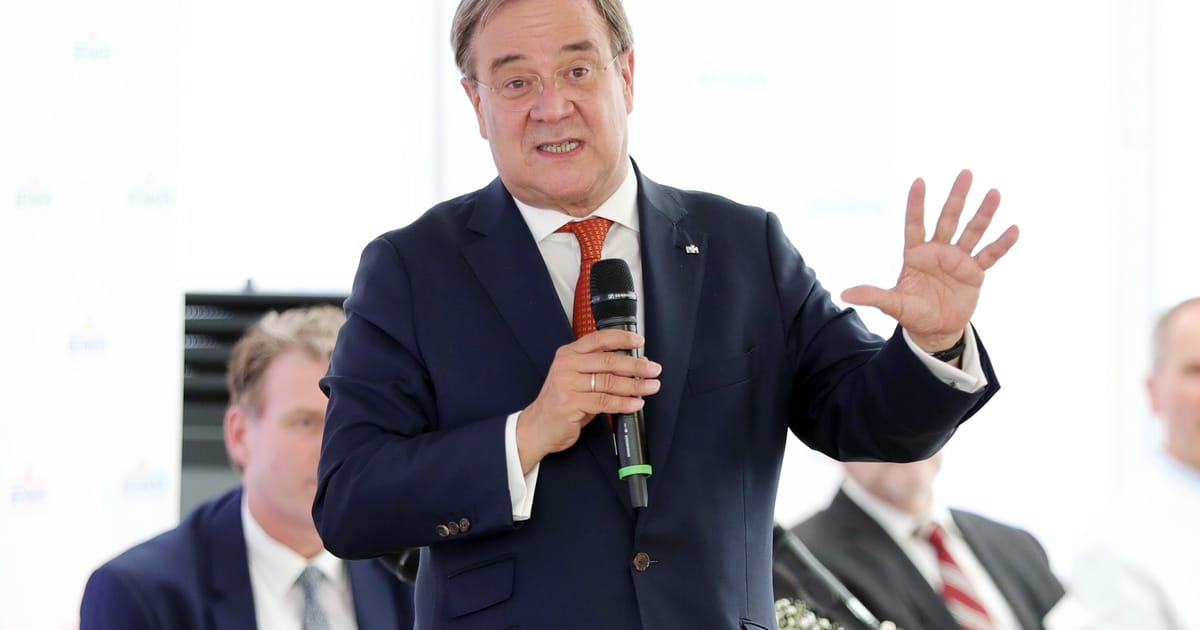Can Germany's New Chancellor Revive European Leadership?

Table of Contents
Domestic Challenges and the Path to European Influence
Germany's ability to exert European leadership is intrinsically linked to its domestic stability and economic strength. A robust German economy is the bedrock upon which its influence in the EU is built.
Economic Stability and Reform
Germany's economic strength is crucial for its European leadership. A strong German economy allows for greater contributions to EU initiatives and projects, and provides the financial muscle necessary to support initiatives for broader European growth and stability.
- Addressing the energy crisis: Successfully managing the transition to renewable energy sources while maintaining energy security is paramount.
- Managing inflation: Controlling inflation and maintaining price stability is crucial for maintaining public confidence and fostering economic growth.
- Fostering sustainable economic growth: Investing in innovation, digitalization, and green technologies is vital for long-term economic prosperity and competitiveness.
- Reforming social security systems: Ensuring the long-term sustainability of social security systems is essential for maintaining social cohesion and economic stability.
The implications of economic stability are far-reaching. A strong German economy enables greater financial contributions to the EU budget, strengthens its negotiating position within the bloc, and empowers it to take on a more assertive leadership role in addressing shared challenges.
Navigating the Coalition Government
Internal political stability within Germany is paramount for effective European leadership. A fractured or ineffective government will struggle to develop and implement coherent foreign policy initiatives.
- Balancing the interests of coalition partners: The new Chancellor must skillfully navigate the diverse interests and priorities of the coalition partners to ensure a unified approach to European and global issues.
- Maintaining public support: Broad public support is necessary for the government to implement ambitious reforms and pursue a strong foreign policy agenda. Declining public support can lead to political gridlock and hamper Germany's ability to act decisively on the European stage.
- Addressing potential internal conflicts: Proactive conflict resolution and clear communication are crucial for preventing internal disputes from undermining Germany's ability to project influence.
The potential impact of internal political friction on Germany’s foreign policy is substantial. Disagreements within the coalition can lead to indecisiveness, weakened negotiating positions, and ultimately, a diminished role for Germany in shaping EU policy.
Germany's Role in the European Union
A strong Germany is essential for deeper European integration. Germany’s leadership is needed to overcome internal divisions and build a more cohesive and effective EU.
EU Reform and Integration
Germany can play a crucial role in driving forward crucial reforms within the EU. Its economic weight and political influence allow for significant impact on various EU initiatives.
- Support for EU budget reforms: Germany’s financial contributions and influence are vital in shaping the EU budget and ensuring its efficient allocation.
- Promoting a stronger common defense policy: Germany's commitment to a stronger European defense is crucial for enhancing the EU's strategic autonomy and security.
- Advocating for enhanced cooperation in key policy areas: Germany must champion collaboration on crucial issues like climate change and digitalization, fostering a more unified EU response.
Germany's ability to shape the future of the European Union is contingent upon its proactive engagement in integration projects. This includes successfully advocating for reforms that strengthen the EU’s economic and political cohesion.
Addressing Challenges within the EU
Internal divisions and disagreements within the EU remain significant hurdles. Effective diplomacy and compromise are critical to overcoming these challenges.
- Managing disagreements between member states: Germany must play a mediating role in resolving conflicts and finding common ground between differing national interests.
- Finding common ground on contentious issues: Negotiating compromises on sensitive issues like migration or fiscal policy is crucial for maintaining EU unity.
- Promoting cooperation and compromise: Germany needs to foster a spirit of collaboration and consensus-building amongst EU member states.
The new Chancellor's ability to address internal challenges will be critical in restoring a sense of unity and purpose within the EU, thereby strengthening its collective leadership.
Germany's Place in Global Geopolitics
Germany's role in global geopolitics is intertwined with its relationship with key international partners and its approach to regional conflicts.
Transatlantic Relations
Maintaining and strengthening ties with the United States is crucial for Europe's global influence. A strong transatlantic partnership amplifies Europe's voice and influence on the world stage.
- Cooperation on defense and security: Close collaboration with the US on defense and security matters is essential for addressing shared threats.
- Economic collaboration: Strong economic ties with the US are vital for maintaining prosperity and competitiveness.
- Shared values and democratic principles: The transatlantic partnership is rooted in shared democratic values, and maintaining these shared principles is crucial for the relationship's strength.
The state of transatlantic relations directly impacts Europe's global standing. A strong partnership with the US enhances Europe's credibility and influence in international forums.
Russia and Eastern Europe
Dealing with Russia requires a balanced approach combining dialogue and deterrence. A strong, unified European response is necessary to address the challenges posed by Russia's actions.
- Maintaining sanctions: Continuing to enforce sanctions against Russia is critical to deterring further aggression.
- Supporting Ukraine: Providing unwavering support to Ukraine is essential for upholding international law and deterring further Russian expansionism.
- Working with European partners to develop a coherent strategy towards Russia: A unified European approach is necessary to ensure effective engagement with Russia while safeguarding European security.
The challenges posed by Russia require a robust and coordinated strategy from Germany and its European partners. A failure to develop a coherent strategy risks jeopardizing security in Eastern Europe and undermining European stability.
Conclusion
The ability of Germany's new Chancellor to revive European leadership depends on numerous factors, from domestic economic stability to skillful navigation of complex geopolitical issues. Success necessitates deft diplomacy, a robust commitment to European integration, and a strong transatlantic partnership. Whether the new administration can overcome these challenges and restore Germany's influence remains uncertain. Only time will reveal if this ambitious goal can be achieved. Continued monitoring of Germany’s actions and the evolving geopolitical landscape is essential to assess the success of Germany’s pursuit of enhanced European leadership. The future of European leadership, in part, rests on the shoulders of Germany's new Chancellor.

Featured Posts
-
 Piecioosobowa Rodzina Zginela Na Przejezdzie Kolejowym Brak Odpowiedzialnych Za Tragedie
May 07, 2025
Piecioosobowa Rodzina Zginela Na Przejezdzie Kolejowym Brak Odpowiedzialnych Za Tragedie
May 07, 2025 -
 Us Antitrust Ruling Could Force Google To Sell Ad Tech Business
May 07, 2025
Us Antitrust Ruling Could Force Google To Sell Ad Tech Business
May 07, 2025 -
 Todays Lotto Lotto Plus 1 And Lotto Plus 2 Results
May 07, 2025
Todays Lotto Lotto Plus 1 And Lotto Plus 2 Results
May 07, 2025 -
 Cavaliers Heat Une Victoire Humiliante De 55 Points Un Record Nba Pulverise
May 07, 2025
Cavaliers Heat Une Victoire Humiliante De 55 Points Un Record Nba Pulverise
May 07, 2025 -
 Pocivaj V Miru Kako Se Spopasti Z Zalovanjem
May 07, 2025
Pocivaj V Miru Kako Se Spopasti Z Zalovanjem
May 07, 2025
